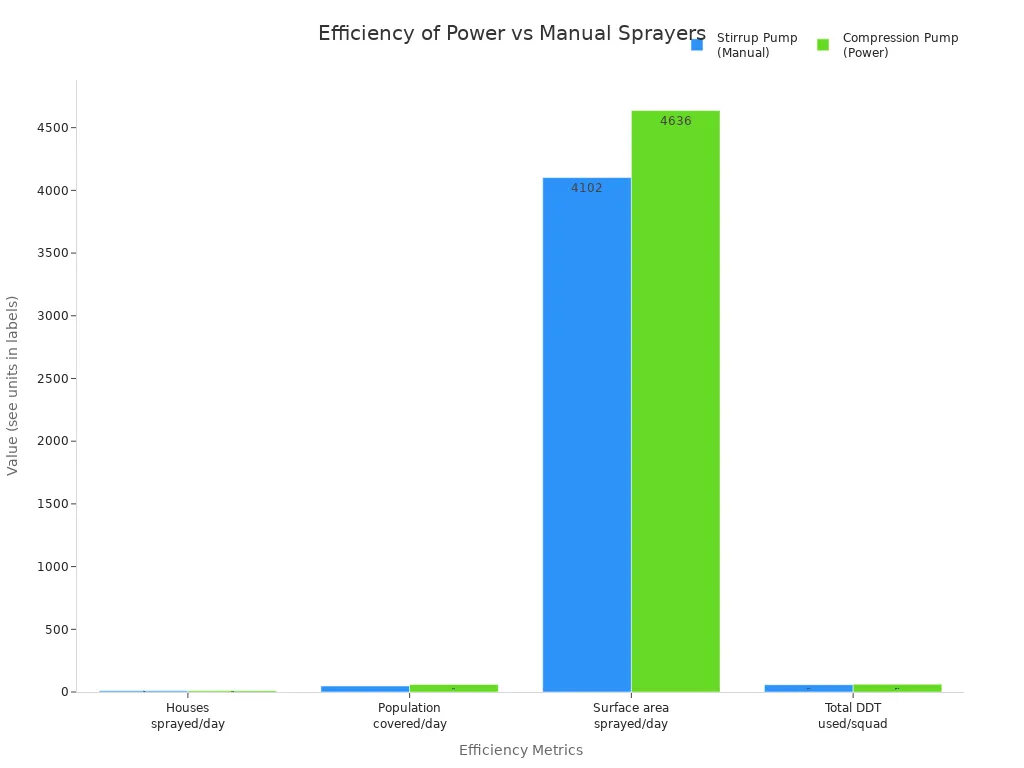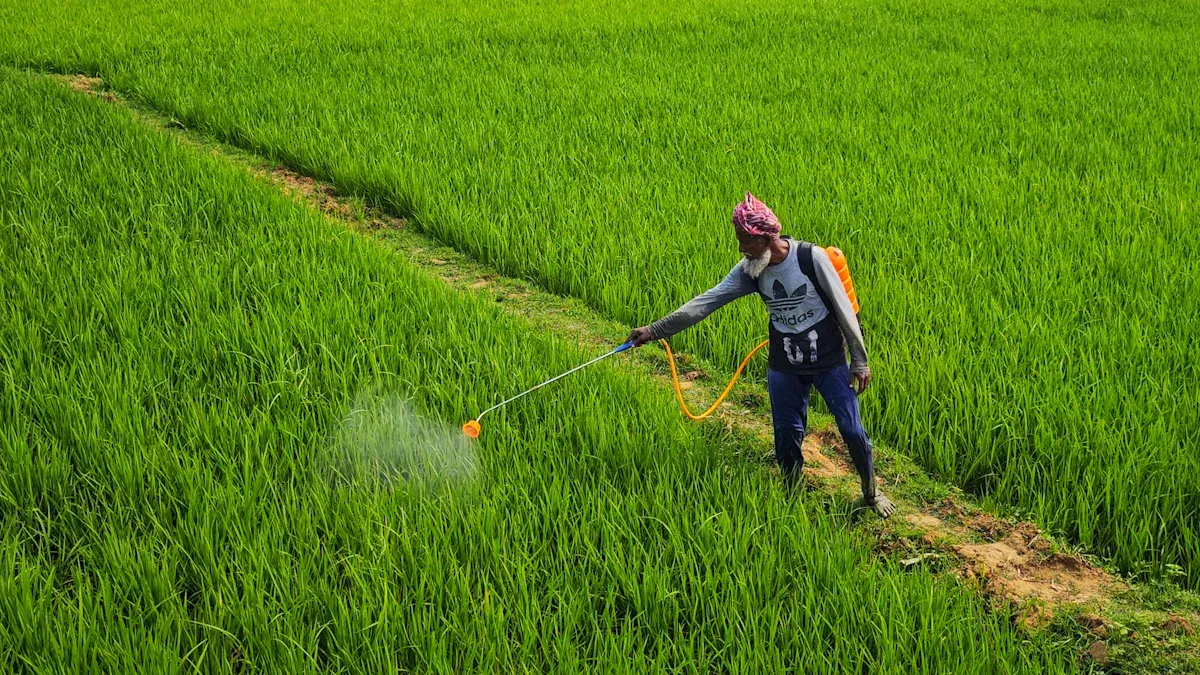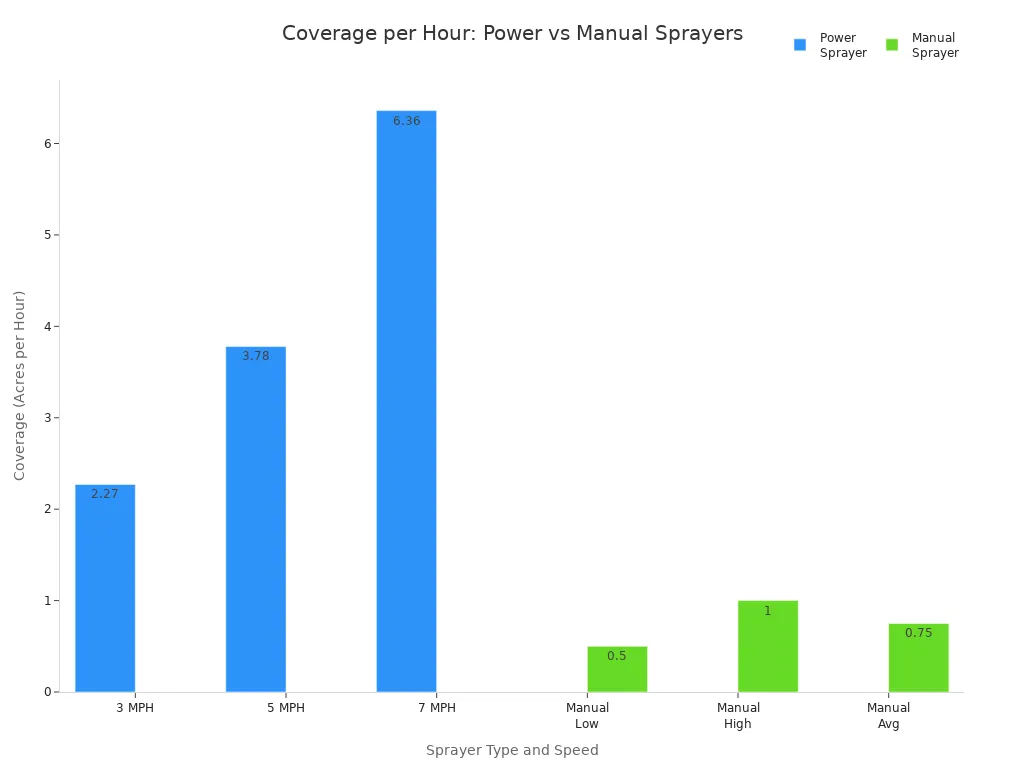You want spraying to be faster and easier. You also want it to work better. A Power Sprayer helps you more than a manual sprayer. Look at the numbers to see the difference:
Save time and do less hard work with more coverage each day.
Get even and exact spraying. This helps stop waste.
Spend less money by using fewer chemicals and less maintenance.
Use safer and easy tools. They help keep you and nature safe.
Key Takeaways
Efficiency
Time Savings
You want to finish your spraying jobs quickly. A power sprayer helps you do that. You do not need to stop and pump by hand. Battery-powered sprayers keep steady pressure, so you spray without breaks. You can work for hours on one charge. This means you finish faster and feel less tired.
Manual sprayers slow you down. You must pump them often, which takes time and energy.
Power sprayers let you spray large areas without stopping. You save time and get more done each day.
Adjustable nozzles and controls help you work even faster.
You feel less tired after using a power sprayer, even on big jobs.
Tip: If you have a big yard or field, a power sprayer will help you finish in less time and with less effort.
Coverage Area
A power sprayer covers more ground in less time. Manual backpack sprayers can only cover about 0.5 to 1 acre per hour. Power sprayers, like tractor-mounted or airblast models, can cover much more. Some can spray 2 to 6 acres per hour, or even up to 100 acres per day for the largest models.
Sprayer Type | Coverage Area per Hour/Day | Notes |
Manual Backpack Sprayer | 0.5 to 1 acre per hour | Good for small areas; needs manual effort |
Tractor-Mounted Sprayer | 10-50 acres per day | Medium orchards; powered by tractor |
Airblast Sprayer | 20-100 acres per day | Large orchards; covers big areas fast |
You can use a power sprayer for many jobs—pest control, weed control, or fertilizer. High flow rates and long reach help you spray wide spaces quickly. Wheeled and trailer sprayers hold more liquid, so you refill less and work longer.
Note: If you want to save time and cover more area, choose a power sprayer for your next project.
Consistency
Even Application
You want every inch of your lawn, crops, or driveway to get the right amount of spray. A Power Sprayer gives you that control. You do not have to worry about missing spots or soaking some areas too much. The machine keeps the pressure steady, so the spray comes out evenly every time.
Power sprayers use self-pressurized systems powered by batteries, electric motors, or gasoline engines. This means you get a uniform spray pattern and even coverage.
Adjustable nozzles let you set the spray just how you want it. You can match the spray to your plants or surfaces.
You cover large areas quickly and evenly. You do not waste time going back to fix missed spots.
Manual sprayers need hand pumping. This causes the pressure to change, so the spray is not even. You end up with patchy results.
Uniform application matters for your crops, lawn, or any treated surface. When you spray evenly, you protect your plants from pests and diseases. You also avoid using too much product, which saves money and helps the environment.
Tip: Use a power sprayer to get a smooth, even coat every time. Your plants and wallet will thank you.
Precision
You want to use just the right amount of product—no more, no less. Power sprayers help you do this with precision. The steady pressure and adjustable settings let you target exactly where you need to spray.
Electric sprayers keep the pressure constant, so you do not over-apply or waste chemicals.
Adjustable nozzles let you control droplet size and spray direction. You can match the spray to your crop’s needs.
Drone sprayers and advanced models use GPS and low-volume spray methods. Studies show these can cut chemical use by 30–50% and boost coverage accuracy to over 90%.
Uniform coverage means you avoid underdosing, which can leave pests behind, and overdosing, which wastes money and harms the environment.
When you use a power sprayer, you get better results. Your crops grow stronger, your lawn looks greener, and you spend less on chemicals. You also help protect the environment by reducing waste and drift.
Versatility
Multiple Uses
You need a tool that can do many things. A power sprayer is good for lots of jobs. You can use it in your yard, on a farm, or at work. It can spray pesticides, herbicides, fungicides, fertilizers, and cleaning liquids. You save time and energy because one tool does everything.
You can reach tall bushes and thick plants easily.
You can spray big fields, small gardens, or business areas.
You can pick battery, electric, or gasoline models for your needs.
These sprayers are made to be comfy for long jobs.
Here is a simple chart that shows which sprayer works best for each job:
Sprayer Type | Typical Uses |
ATV Sprayers | Big land, pastures, food plots; rough ground |
UTV Sprayers | Homes, businesses, farms; watering and chemical spraying |
Trailer Sprayers | Fertilizing, watering; pulled for large jobs |
Spot Sprayers | Small area spraying; attach to mowers or utility vehicles |
3PT Sprayers | Parks, sports fields, golf courses; spraying weeds, bugs, and water |
Tip: You can use a power sprayer for almost any job, big or small. This saves you money because you do not need lots of tools.
Adjustable Settings
You want to control how you spray things. New power sprayers let you do this. You can change the nozzle for a soft mist or a strong spray. You can also change the spray shape and pressure for each job.
This means you use less product and get better results. You do not waste as much and you save money. You also keep your plants and things safe by giving them just what they need.
Pick a soft mist for flowers or a strong spray for weeds.
Change the pressure for different liquids and surfaces.
Use comfy handles and safety valves for easy and safe spraying.
Note: USDA says adjustable nozzles can make you work up to 50% faster. You finish more work with less effort.
A power sprayer can change to fit your needs. You always get the right spray, whether you work at home or on a big farm.
Cost-Effectiveness
Lower Maintenance
You want a sprayer that works hard without needing constant repairs. Electric sprayers make your life easier. They have fewer moving parts than gas-powered models. You do not need to worry about oil changes, spark plugs, or fuel system cleaning. Most of the time, you only need to check the battery and replace a pressure switch once a year. This saves you time and money.
Here is a quick look at how maintenance compares:
Sprayer Type | Maintenance Needs | Notes |
Electric Sprayers | Simple cleaning, battery checks, rare part swaps | No oil or fuel needed |
Gas-Powered Sprayers | Oil changes, spark plugs, fuel cleaning, more parts | More work and higher repair costs |
Manual Sprayers | Basic cleaning | Few parts, but less power and coverage |
You spend less time fixing and more time spraying. Electric sprayers also last longer because they avoid engine problems. You keep your equipment running and your wallet full.
Tip: Choose an electric sprayer if you want less hassle and lower long-term costs.
Product Savings
You want to save money on chemicals and labor. Power sprayers help you do both. They spray chemicals exactly where you need them. You use less product and avoid waste. Adjustable nozzles and pressure controls let you set the perfect amount for each job.
You cover large areas quickly, so you need fewer workers.
You use just the right amount of spray, saving expensive chemicals.
High-efficiency nozzles cut down on drift and runoff.
Automated features like GPS and spray controllers make every drop count.
Modern sprayers let you finish jobs faster and with fewer mistakes. You spend less on supplies and labor. You also help the environment by using only what you need.
Note: When you use a precise sprayer, you save money and protect your land.
Ease of Use & Safety
User-Friendly Design
You want a sprayer that is simple to use. New sprayers are light and have soft straps. These help you work longer without getting tired. You can adjust the straps and handles for comfort. This makes it easy for anyone to use, even if you are new. You can change how the spray comes out with easy knobs. Clear guides and big labels show you what to do. Some sprayers let you spray paint or chemicals right from the can. This means you do not need extra steps. Cleaning up is fast because you can take the sprayer apart easily.
Light and easy-to-carry sprayers help you not get tired.
You can change the spray for any job.
Soft straps and comfy handles make spraying nicer.
Simple guides and labels help you start quickly.
Extra parts like long tips and filters let you do more.
Tip: Pick a sprayer with soft straps and simple controls. You will finish faster and feel better after working.
Safety Features
You want to stay safe while you spray. Sprayers now have built-in safety parts to protect you and your space. Battery sprayers make less noise and fewer fumes. Special nozzles and pressure parts keep the spray even and stop it from drifting. Some sprayers turn off by themselves and have clear gauges to stop spills. You can find safety tips and help guides with many sprayers, so you always know what to do.
Soft straps and harnesses help stop injuries.
Auto shut-off and pressure parts stop leaks and spills.
Special nozzles help keep spray from drifting away.
Battery sprayers lower the risk of breathing in fumes.
Safety guides and clear steps help you use it right.
Note: Always check your sprayer before you use it. Good care and setup keep you safe and stop accidents.
Environmental Impact
You want to keep your land and nature safe. New sprayers let you spray only where you need. This saves up to 30% of chemicals and keeps plants, bugs, and water safe. You can change the spray size and width to stop runoff and drift. Electric sprayers also help stop fuel spills and pollution. Using these sprayers helps you care for the earth.
Spraying only where needed saves money and chemicals.
Less drift and runoff keep water and animals safe.
Electric sprayers help stop soil and water pollution.
Spraying in the right spots keeps good bugs safe.
Smart controls help you not use too much.
Callout: Spraying with care helps your crops and the planet.
Power Sprayer Types
Electric vs. Gas
You have many choices when picking a power sprayer. The two main types are electric and gas-powered. Each type has its own strengths and fits different jobs. Look at this table to see how they compare:
Feature / Aspect | Gas Power Sprayers | Electric Power Sprayers |
Power (PSI) | 2,500 to 4,000 (higher) | 1,300 to 2,300 (lower) |
Mobility | No cords, very mobile | Cord or battery limits range |
Noise Level | Loud | Quiet |
Weight | Heavy | Light |
Maintenance | Needs oil, fuel, filter cleaning | Needs little maintenance |
Emissions | Fumes, outdoor use only | No fumes, safe indoors |
Best Use | Big, tough jobs | Routine, smaller jobs |
Durability | Very durable | Easy to maintain |
Gas sprayers give you more power and work well for big jobs like cleaning driveways or spraying large fields. They are heavier and need more care. Electric sprayers are lighter, quieter, and easier to use. You can use them for smaller jobs, like spraying your garden or washing your car. Battery-powered electric sprayers now last longer and help you work all day without stopping to recharge.
Tip: If you want a sprayer that is easy to carry and safe for indoor use, choose electric. For heavy-duty outdoor work, gas is the better choice.
Choosing the Right One
You want the best sprayer for your needs. Think about these points before you buy:
Area Size: Use a small sprayer for gardens. Pick a backpack or tractor-mounted sprayer for large fields.
Job Type: For tough, high-pressure jobs, gas sprayers work best. For routine or indoor tasks, electric sprayers are safer and easier.
Portability: If you move your sprayer often, choose a lighter model.
Maintenance: Electric sprayers need less care. Gas models need regular oil and filter changes.
Budget: Electric sprayers cost less to run and fix. Gas sprayers last longer but cost more to maintain.
Features: Look for adjustable nozzles, comfy straps, and easy-to-read controls.
Experts say you should match your sprayer to your job and always check for safety features. Ask for advice if you are not sure. Test the sprayer if you can before you buy. The right power sprayer will save you time, money, and effort every season.
You can spray faster and safer with new equipment. Homeowners finish garden work in less time. Farmers help their crops and use fewer chemicals. Professionals do big jobs with less work and better results.
Better accuracy and using less chemicals keep you and your land safe.
Easy-to-change settings and comfy designs make spraying simple.
Smart tools and expert tips help you pick the right sprayer.
Pick the best model for your needs and get great results every season.
FAQ
How do you clean a power sprayer after use?
You should rinse the tank with clean water. Run water through the sprayer for a few minutes. Remove and clean the nozzle. Dry all parts before storing. This keeps your sprayer working longer and prevents clogs.
Can you use a power sprayer for different liquids?
Yes, you can. Power sprayers handle many liquids like fertilizers, pesticides, and cleaners. Always rinse the tank between uses. This prevents mixing chemicals and protects your plants and surfaces.
Is a power sprayer safe for beginners?
Absolutely! You can use a power sprayer even if you are new. Most models have simple controls and clear instructions. Lightweight designs and safety features help you spray with confidence.
How often should you maintain your power sprayer?
Check your sprayer before each use. Clean the tank and nozzle after every job. Inspect hoses and seals monthly. Replace worn parts as needed. Regular care saves you money and keeps your sprayer ready.
What size power sprayer do you need?
Pick a small handheld sprayer for gardens or patios. Choose a backpack or wheeled sprayer for larger yards. For farms or big fields, use a tractor-mounted or trailer sprayer. The right size helps you finish faster and saves effort.















